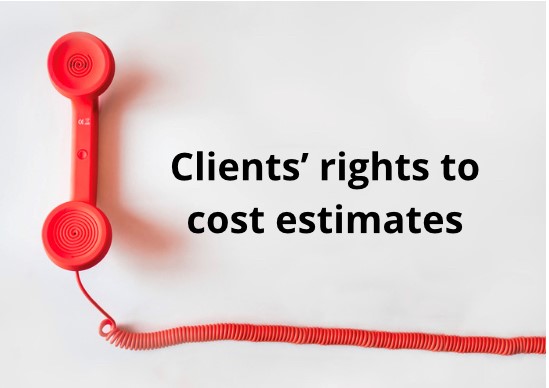
What are client’s rights to cost estimates when instructing legal practitioners?
The Legal Practice Act 28 of 2014 (LPA) came into force on 1 November 2018. The LPA governs legal practitioners (attorneys and advocates) and prescribes how legal practitioners must give clients upfront cost indications and confirm legal instructions before proceeding with billable legal services.
In terms of Section 35(7) of the LPA, Practising Attorneys and Trust Account Advocates must provide a written notice (email/text will suffice) confirming a legal instruction and giving a cost estimate to a client, upon receiving formal instructions, or as soon as practically possible thereafter.
The written notice must include all the following details:
- The likely financial implications including fees, charges, disbursements and other costs.
- The hourly rate of the attorney or advocate and an explanation to the client of his/her right to negotiate the fees payable to the attorney or advocate.
- An outline of the work to be done in respect of each stage of the litigation process, where applicable.
- The likelihood of engaging an advocate, as well as an explanation of the different fees that can be charged by different advocates, depending on the aspects such as seniority or expertise.
- If the matter involves litigation, the legal and financial consequences of the client’s withdrawal from the litigation, as well as the costs recovery regime.
Section 35(8) prescribes that Practising Attorneys and Trust Account Advocates must explain every aspect of the above notice verbally (telephonically/voice note).
Section 35(9) further prescribes that a client must in writing (text/email) agree to the envisaged legal services and incurring the estimated costs.
Non-compliance by a Practising Attorney or Trust Account Advocate with the above constitutes misconduct. In the event that a Practising Attorney or Trust Account Advocate did not comply with the above, aggrieved clients can lodge requests with the Legal Practice Council to review the matter and make a determination regarding amounts to be paid.
The above does not preclude the use of contingency fee agreements in terms of the Contingency Fees Act 66 of 1997.
Complaints regarding non-compliance by legal practitioners relating to Section 35 of the LPA can be addressed to the Legal Practice Council and/or the Legal Ombud.
As a client, do not hesitate to request your lawyer to explain costs and procedures before giving formal instructions.
Our lawyers are ready to assist!
LWFH Management